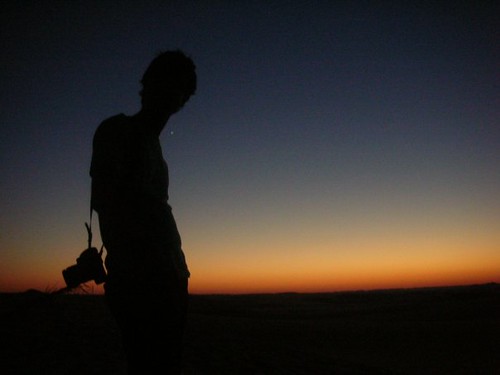I'm ready to give up on some grand explanation, and instead focus on the details... (small differences, if you will.)
1.

Something is wrong when i can't tell the difference between a modern bathroom...

...and the ancient palace complex it is meant to "compliment."
Thanks, but no thanks. I can see the same thing at Epcot. (which i have. its actually kind of interesting.)
When you juxtapose the True Past with a modern duplicate, you complicate matters of authenticity and value. And unless we're dealing with something truly awe-inspiring and unique (like the pyramids or the alps), authenticity is really all that something old has to offer.
When you build a bathroom as beautiful as the adjacent site, you're just reminding me that the site itself isn't unique.
And once you negate the mystique of uniqueness, you point out the secret that any encounter with the Ancient is illusionary, and is inevitably wrapped in the historical process that has carried it to the present...
2.

When you erase decay, you undo meaning.
Decay is an inevitable and important part of historical sites. It is the scars and beauty marks that separate man from mannequin, real from reproduction.
But in Korea, decay at historical sights is viewed with the same disdain as decay in the home - an embarrassing blemish that distracts from the 'true' beauty and significance of the site in question.
But Travel is not about recapturing the past the way it once existed, that's what time travel is for. Travel is about viewing a process, a continuous and eternal cycle of growth and decay.
Sometimes we travel to see the breadth of the process as it has effected one site. Turkey is a remarkable layering of cultures spilling over each other, a living museum to the triumphs and failures of both the West and the Middle East. Other times we travel to see a single point in the decay/growth cycle. We see a modern technophile Japan or a starving Cairo, and our own lives serve as the reference to 'normalcy.'
Because in the end, travel is ultimately about understanding the old as it relates to us now.
In Egypt they leave one Past in the context of the many Pasts that followed. Statues remain toppled, ancient graffiti is ubiquitous. And it is this accumulation of pasts that gives meaning to Places, that makes them historic. But in Korea one Past is singled out and preserved to the detriment of all others. Cultural sites have been swept clean of narrative, of the inevitable expansions and re-appropriations that history has wrought.
Would (could?) Shelly have written Ozymandias if the Egyptian government had restored or removed all the fallen statues? Could we ever understand our own place in history if all we saw of the past was it's leaders desired projections of excellence?
All This doesn't mean you should leave the 5000 year old layer of grime over king Tut's golden crown. It just means you shouldn't confuse the 'Past as an object' with the 'Past as a narrative'. We may delight in viewing the Past's objects - but truth, beauty, and meaning inevitably come from observing it's narrative...
I met a traveller from an antique land
Who said: Two vast and trunkless legs of stone
Stand in the desert. Near them on the sand,
Half sunk, a shatter'd visage lies, whose frown
And wrinkled lip and sneer of cold command
Tell that its sculptor well those passions read
Which yet survive, stamp'd on these lifeless things,
The hand that mock'd them and the heart that fed.
And on the pedestal these words appear:
"My name is Ozymandias, king of kings:
Look on my works, ye mighty, and despair!"
Nothing beside remains: round the decay
Of that colossal wreck, boundless and bare,
The lone and level sands stretch far away.
- Percy Bysshe Shelley















